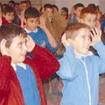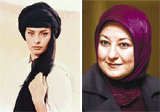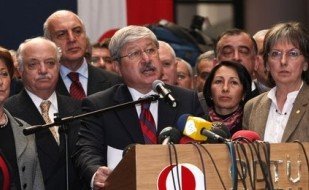During the 12th and 15th National Science Olympics, organised by the Scientific and Technological Research Council of Turkey (TÜBITAK) and attended by Minister of Education Hüseyin Celik, a headscarved primary school pupil came onto stage to receive her prize. Celik later criticised the organisors for allowing the pupil to dress in that way. He said that it was clear that it would draw criticism.
Children suffer
We are used to the government and the opposition arguing over the headscarf issue. However, what stays invisible, but is, according to education expert Erkan Aydoganolgu of the Egitim-Sen trade union the most important, is the effect on children.
If we add to the equation the children's families, whose "right to participate" is being violated, it becomes clear that the struggle for control over children has greater dimensions. It is experienced in their daily lives, at home and at school.
Girls suffer more because the debate is held over their bodies. Because the religiosity of boys is not symbolised by a headscarf, they can make use of the right to education with fewer problems.
Religion imposed from birth
In Turkey, the ID cards have a space where a person's religious affiliation is registered. A child is automatically registered as having the religion of his/her parents, and this disregard of children continues throughout life.
For instance, families can decide to send their children to Koran courses. It is unlikely that children themselves come home and demand to be sent to such courses. Experts argue that religious education at a young age can have negative effects on a child. A teacher told bianet that children who went to such courses displayed a certain "mental dullness". A pedagogue added that religious education before the age of 10 could lead to "the deepening of fears".
Home and school may clash
Now consider a girl growing up with all of these influences; the girl starts school. When she starts middle school with a headscarf, which is rarely her own choice, she has probably appropriated and got used to this life style. Maybe she finds it right and decides that this life suits her. But what is the real issue is the beginning of the story, the power a family has over its children.
When a child goes to school, it is confronted with a life that clashes with what it was taught by its family. It cannot enter the school with a headscarf, it cannot receive a prize with a headscarf. This, argues Aydoganoglu, most likely creates "a lifelong lack of self-confidence":
"When we interpret the issue, we must look at it holistically. Children become the bit players in the struggle for political profit. They are negatively affected and damaged by the reactions they get in educational and daily life."
Convention on the Rights of the Child
The United Nations' Convention on the Rights of the Child came into effect in 1990. The Convention, which Turkey has ratified, says:
Article 14/1: "States Parties shall respect the right of the child to freedom of thought, conscience and religion."
Article 16/1: "No child shall be subjected to arbitrary or unlawful interference with his or her privacy, family, home or correspondence, nor to unlawful attacks on his or her honour and reputation." (GG/TK)











